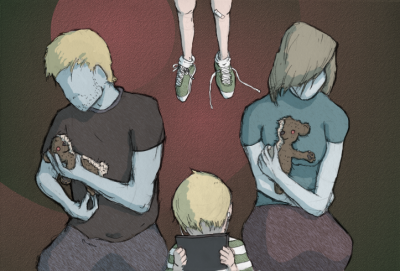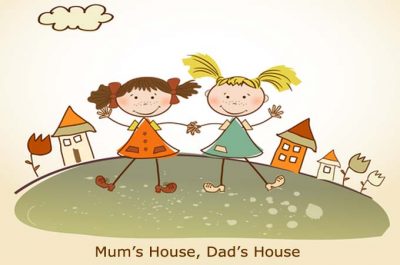
For a Lesbian Couple, Marriage Equality Was No Guarantee of Marriage Quality
In Unhitched, longtime couples tell the stories of their relationships, from romance to vows to divorce to life afterward.
When Massachusetts legalized same-sex marriage in 2004, a Boston couple, Sara Orozco and Lori Herman, had been together for seven years and were raising twin boys. Swept up in the frenzy, friends and family expected them to wed — and they did not disappoint them.
Yet faced with the stresses of raising children and lacking strong role models for working on relationships, they were unable to make their union last.
Where did they grow up?
Sara in Miami. Her parents fled Cuba in 1959; they divorced when she was in high school. Lori grew up in the Boston suburbs; her parents divorced when she was in college.
How did they meet?
In 1997 in a gay bar in Boston. Each was attracted to the other’s sense of humor and love of adventure and fun. Their first date was to a dune shack on Cape Cod.
What were the early years like?
A year later, Sara was diagnosed with breast cancer; Lori’s mother had recently died from complications of the same disease. Immediately their relationship became serious.
After Sara’s treatment finished, they rushed to have children. Lori, then 40, became pregnant; twin boys were born in 1999. “I felt lucky to be alive, and we loved each other,” Sara said, in reference to jumping in so quickly.
Were they happy?
They were busy, but their relationship wasn’t great. “When you have kids, that’s what happens,” Lori said. “We were a team, but not a couple. We didn’t have any private time.” They bought a house and a minivan. Both were studying and developing their careers.
First signs of trouble?
“We weren’t prepared for what hit and the stress of having twins,” Lori said. They didn’t fight with each other, but they didn’t talk things out, either. Both felt lonely. “I unintentionally placed our relationship as a third or fourth priority — if at all,” Sara said. Both feared the cancer recurring.
Why did they marry?
Neither thought they’d ever be able to marry as lesbians. But in 2004, when same-sex marriages became legal in their state, they had already been together seven years. Friends and family expected them to marry immediately. “Our nongay friends were our biggest cheerleaders,” Sara said. “We should have stopped and looked at our relationship rather than listening to everyone else,” Lori said.
Who asked for the split?
Sara did. Lori was angry and felt “dispensable.” “We both come from divorce, and neither of us had a model for working on relationships,” Sara said. “I hope we haven’t given our children that model.”
Did they try therapy?
Yes, for over a year. But in 2006 they agreed to separate in a way that would affect the boys, then in second grade, as little as possible. They lived together until Sara found an apartment. They got a puppy, which, along with the boys, shuttled back and forth between their homes on alternate days. The dog, Lily, a fluffy mixed breed, has been a constant for the boys.
What about the final breakup?
There was pain on both sides that they kept from the boys. “They never saw us fight,” Lori said. But the first two years were really hard. “That first night alone was devastating,” she said.
Did they feel stigmatized?
Yes. Their families were supportive, but others, including some gay acquaintances, were not. Many people assumed that they had been married to men when they told of being divorced. Lori’s friends were mad at Sara for calling it over, but Lori encouraged everyone to get along. “We were always going to be family,” she said.
How did they move on?
Slowly. Sara began to date in the first year, and soon wanted Lori to meet the woman she had met. Lori was devastated and took time before doing so. “Time is what it took for everything,” Lori said. “We learned how to communicate. Otherwise we knew our kids would pay the price.” Eventually, Sara’s new partner — and future wife — was integrated into the children’s lives.
How did they fare financially?
Everything each person brought to the marriage remained with her, and they split everything else. A meditator urged them not to quibble over material things.
How did their children react?
Though young, they understand divorce, but there was lots of sobbing, which lasted a few months. Now the boys don’t remember a time when the two were married. For a while they kept asking them why they split, but it was hard to explain and they eventually stopped asking.
Should they have divorced sooner?
Both say no. Lori said: “If we knew then what we know now, could we have made it work? It’s sad to think about the relationship we developed in order to have the kids, and the family we so wanted was the one thing we couldn’t hold on to.”
Is their new life better?
Each one has the boys every other weekend, so both have more time to themselves. Sara remarried this past April, and Lori was in her wedding party. “That was difficult in the moment, but I love her new wife,” said Lori, who is now dating.
Would they have done anything differently?
Both say they were swept up in the excitement of the marriage-equality movement. Both also agree that they should have given more time and attention to the relationship and not just to the children.
Looking back, what advice would they offer?
In the lesbian community, many women stay close to their ex-girlfriends. The same should apply to ex-wives. “My generation of lesbians knew that post-breakup you had to get along,” Sara said. “Our communities were small, and we were often each other’s best friends. I hope that doesn’t change as gays and lesbians move into the mainstream.”
Lori advises not to get complacent. “I was lazy in communicating,” she said.
What is life like now?
They are busy with the boys and their many activities. They parent well together and call or text several times a day. “We’re great friends, and Sara is my health care proxy,” Lori said. ”And if she can’t do it, her new partner is next in line. Sometimes we need all three of us to manage everything with the boys.”
“Lori and I now have an incredible relationship,” Sara said. “I don’t know if we could have done that if we had stayed married.”
Has either person changed?
Sara is better at keeping her second marriage healthy, she said.
Lori said she learned that relationships need work. “I truly thought that if we had kids and a house we would never break up,” she said. She said that early in their relationship Sara asked her to go to therapy and she refused. “It was stupid,” Lori said. “I should have done the work. That’s on me.”
Advice for others who are divorcing?
Be patient for the sake of the children, let them guide the timing and the pace, Sara said. Lori has advice for other gay and lesbian couples: Be careful about adapting nongay traditions, both in marriage and in divorce. “Lesbians have always mated for life, even if we’re not together in a couple,” Lori said. “It was way easier to get married than get divorced.”
Credit: The New York Times
Share this story
-
Very good https://is.gd/N1ikS2
-
Awesome https://is.gd/N1ikS2
-
Good https://is.gd/N1ikS2
-
Good https://is.gd/N1ikS2
-
Very good https://is.gd/N1ikS2
-
Good https://is.gd/N1ikS2
-
Awesome https://urlr.me/zH3wE5
-
Awesome https://lc.cx/xjXBQT
-
Awesome https://shorturl.at/2breu
-
Very good https://shorturl.at/2breu
-
Very good https://is.gd/tpjNyL
-
Thank you for sharing this insightful article! I found the information really useful and thought-provoking. Your writing style is engaging, and it made the topic much easier to understand. Looking forward to reading more of your posts!

